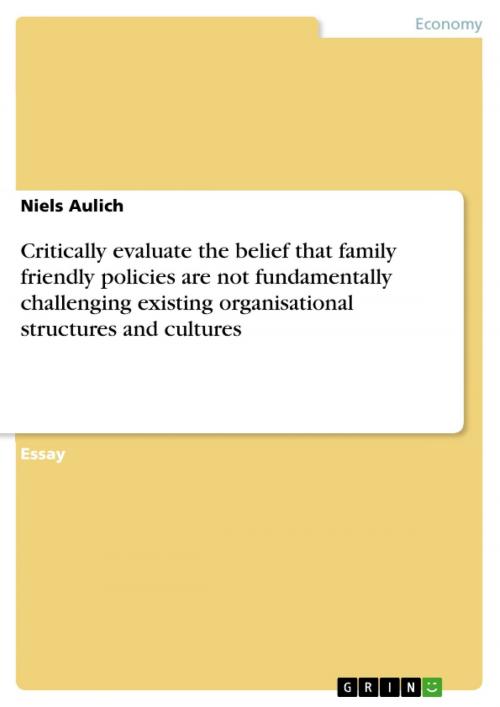Critically evaluate the belief that family friendly policies are not fundamentally challenging existing organisational structures and cultures
Business & Finance, Management & Leadership, Management| Author: | Niels Aulich | ISBN: | 9783656206286 |
| Publisher: | GRIN Publishing | Publication: | June 1, 2012 |
| Imprint: | GRIN Publishing | Language: | English |
| Author: | Niels Aulich |
| ISBN: | 9783656206286 |
| Publisher: | GRIN Publishing |
| Publication: | June 1, 2012 |
| Imprint: | GRIN Publishing |
| Language: | English |
Essay from the year 2012 in the subject Business economics - Business Management, Corporate Governance, grade: B - 67, Heriot-Watt University Edinburgh (School of Management and Languages), language: English, abstract: It is generally agreed today that working is not the only essential part in life for a human being, rather it is aimed to have both fulfilment within the family, partner or in the social structure and realisation of the personal career goals to reach a life in balance. Furthermore, in times of globalisation related to the increasing international division of labour, skills shortage and the demographic change mean a shift in our common understanding that leads to changing notions not only in an economical point of view but also in a socio-cultural perspective of each individual. In addition to that, companies connect their key to success with a high motivated and passionate employee; to emphasise high commitment sustainably. Thus, family friendly policies (FFP) find their way into the business sector to achieve growing commitment of their workforce internally due to changing work rules or externally, with state intervention in shape of statutory provisions. Moreover, FFP are indicated to alter the existing culture and corporative structure in an unprecedented way which is discussed in sciences, economics and politics widely. The main question which arises is: Do FFP have direct influence on a business entity to alter the organisational structure or even the whole culture and what are the characteristics of those in a more detailed consideration? This essay spars with the topic: Critically evaluate the belief that family friendly policies are not fundamentally challenging existing organisational structures and cultures; in reality 'they are playing around at the margins'. The structure of this essay relates to FFP within the business environment and their importance to proof the belief, that they are not changing the existing organisational structure and culture. The main body is separated into four parts. Firstly, this essay will examine the key traits of family friendly policies. Secondly, this essay will consider the term organisational structure and thirdly, the term organisational culture to face the issue of the study. The last chapter of the main body will reveal arguments on the basis of advantages and disadvantages in terms of an argumentative discussion. Finally, the conclusion summarises the main arguments and gives a firm stand.
Essay from the year 2012 in the subject Business economics - Business Management, Corporate Governance, grade: B - 67, Heriot-Watt University Edinburgh (School of Management and Languages), language: English, abstract: It is generally agreed today that working is not the only essential part in life for a human being, rather it is aimed to have both fulfilment within the family, partner or in the social structure and realisation of the personal career goals to reach a life in balance. Furthermore, in times of globalisation related to the increasing international division of labour, skills shortage and the demographic change mean a shift in our common understanding that leads to changing notions not only in an economical point of view but also in a socio-cultural perspective of each individual. In addition to that, companies connect their key to success with a high motivated and passionate employee; to emphasise high commitment sustainably. Thus, family friendly policies (FFP) find their way into the business sector to achieve growing commitment of their workforce internally due to changing work rules or externally, with state intervention in shape of statutory provisions. Moreover, FFP are indicated to alter the existing culture and corporative structure in an unprecedented way which is discussed in sciences, economics and politics widely. The main question which arises is: Do FFP have direct influence on a business entity to alter the organisational structure or even the whole culture and what are the characteristics of those in a more detailed consideration? This essay spars with the topic: Critically evaluate the belief that family friendly policies are not fundamentally challenging existing organisational structures and cultures; in reality 'they are playing around at the margins'. The structure of this essay relates to FFP within the business environment and their importance to proof the belief, that they are not changing the existing organisational structure and culture. The main body is separated into four parts. Firstly, this essay will examine the key traits of family friendly policies. Secondly, this essay will consider the term organisational structure and thirdly, the term organisational culture to face the issue of the study. The last chapter of the main body will reveal arguments on the basis of advantages and disadvantages in terms of an argumentative discussion. Finally, the conclusion summarises the main arguments and gives a firm stand.















